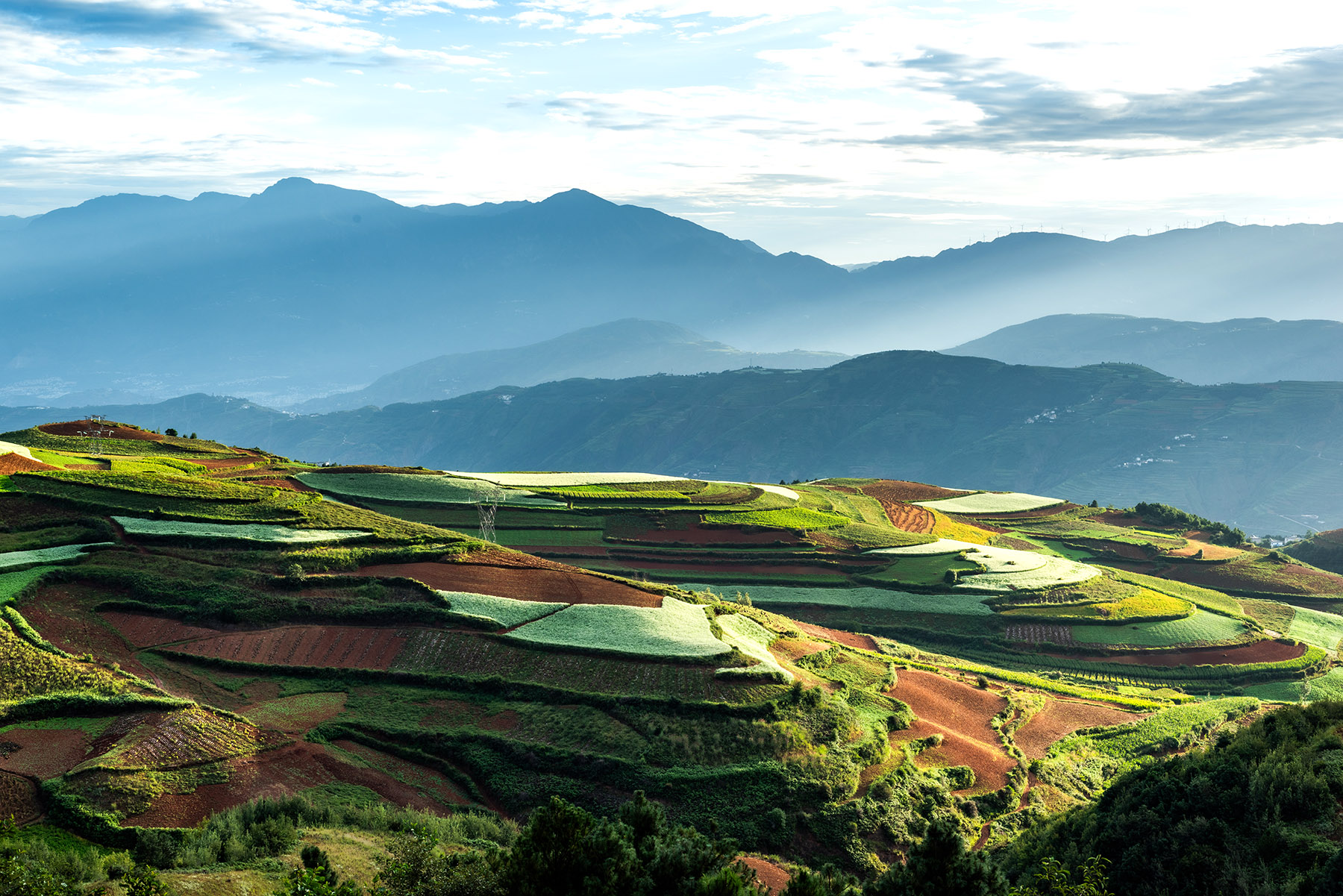Authorities tap into natural wonders, attract more long-stay visitors, retirees

Yunnan province has elevated its reputation as China's preferred tourism playground in recent years, with visitors encouraged to embrace the botanical wonderland and treat it as a second home.
At the heart of the tourism success is the southwestern province's stunning scenery and its rich tapestry of ethnic cultures. Celebrated as the "kingdom of plants and animals" and the "world's garden", Yunnan has taken advantage of its enviable reputation for cultural tourism to draw both domestic and international travelers.
In 2024, the province's tourism revenue reached a record 1.14 trillion yuan ($158.7 billion), with 3.9 million long-stay travelers, a 20.7 percent year-on-year increase, according to a Yunnan provincial government report.
From January to November, over 50 percent of visitors came from all across the country, with repeat travelers accounting for 77 percent of all arrivals, the data showed.
READ MORE: Yunnan sprouting into nation's 'vegetable basket'
In recent years, Wang Ning, secretary of the Communist Party of China Yunnan Provincial Committee, has responded to netizens expressing their love of the province, and invited them to experience in person its tourism slogan-"Yunnan, where your ideal life lives".
"Many ask me what exactly is 'an ideal life, called Yunnan'. I believe beyond the tourism buzz lies the true human touch; moving from online warmth to living warmth," Wang said.
To make this happen, the provincial leadership's upgrade of the tourism sector has included integration of cultural tourism and enhancement of people's well-being.
"Guests should become like family, transforming Yunnan's verdant landscapes and nostalgic charm into a 'sanctuary of belonging' that becomes a second home for multitudes of people," Wang wrote in one of his online responses.

A place to linger
The phrase "an ideal life, called Yunnan" has sparked online discussions, garnering over 26 billion views.
The general response has been positive, with some netizens saying the province is a travel destination that not only captivates visitors, but is also ideal for those seeking authentic living and communion with nature.
In recent years, Yunnan has prioritized upgrades of its tourism products and service models.
Dali, for instance, has hosted over 5,000 destination weddings, while Lijiang facilitated over 200,000 travel photography sessions in the past year.
With rural long-stay tourism the strategic focus, the province has implemented preferential policies — notably comprehensive renovation programs for idle village homes — and is actively promoting this sector, especially for international visitors.
Moswen, a 55-year-old from the United States, has lived in China for over 16 years. For 11 of those years he has made his home in Lijiang. Embracing Chinese culture, he has found family, friendship, and career fulfillment, describing Lijiang as giving him a "sense of belonging".
His journey began in 2008 when he moved to Kunming with his family to study Chinese. In 2013, he was invited by a friend to visit Lijiang.
Moswen discovered the climate has a striking resemblance to Washington State, where cold winters and cool summers are perfect for cherry cultivation. This inspired him to establish an agricultural company. He initially grew cherries and apples before specializing in rootstocks and scion seedlings used in plant grafting, which he now supplies across Yunnan.
"We have forged deep friendships here," he said.
Seven years ago, he met a villager surnamed Wei, from the Naxi ethnicity, who today serves as the company's full-time manager. The two work and dine together every day as colleagues who not only trust, but also like each other.
Every Chinese New Year's Eve, Moswen's family joins Wei's household for Spring Festival celebrations.
Moswen's four children have all grown up in China.
"I find Western food too heavy, and Yunnan's rice noodles and fried rice are my favorites," said his youngest daughter Lily.

Beyond the slogan
Michael Hermann, the chief local representative of an international network of nonprofit organizations, has spent lengthy periods in the province since 2005. He describes Yunnan as both a "postcard and project".
His work in sustainable agriculture, early childhood development, and public health has taken him to 15 prefectures and 35 counties, with programs reaching more than 3 million residents.
"In Yunnan we say, 'the mountains and water are beautiful, and the people are kind and nice,'" he said.
Hermann, like many long-stayers, is taken by the stunning surroundings he encounters on a routine basis.
One day it's the Three Pagodas punctuating Dali's rice-green horizon, another it's running laps around Dianchi, or watching a sunrise over Fuxian Lake's foreshore.
Yunnan is "a true place to slow down, learn, think and reflect", where inner quiet makes the world gentler, he said.
David Blair, a retiree who moved to Yuxi after stints in New York and Washington, DC, appreciates the compactness and convenience of the city, which is surrounded by mountains and lakes and is renowned for its tobacco production.
"The transportation here is so convenient," he said. "Almost every road has a bike lane, and there's high-speed rail in town. Farmers' markets are within walking distance, and prices undercut what you would see in megacities like Beijing and Shanghai, let alone the US."
"Everything in daily life is nice," Blair added. "Once I paid 10 yuan, about $1, for a quick outpatient fix to remove a thorn from my toe."

He also said that he has never felt unsafe walking at night in China. "It's one of the most pleasant lifestyles I've seen in the world, and I have been to more than 60 countries and regions," he said.
Yunnan's marketing line doubles as a development model.
The province's latest tourism campaign has strengthened efforts to combine tourism with food culture, housing, transit, healthcare, learning, and wellness. Policies for towns to better serve the tourism sector have also been established, along with platforms to help locals boost profits.
Yunnan's natural advantages are plentiful. The climate is rarely extreme and biodiversity abounds. All this is complemented by charming man-made structures such as pagodas, terraces and tea roads.
For Yunnan's tourism authorities, however, the new measure of success is not a picturesque view going viral. It's visitors coming to the province and deciding to make it their home. "Guests" becoming "family" is central to their policy.
These foreign long-stayers demonstrate this philosophy and have steadily built a connection with their new home through activities such as market visits, and interaction with their neighbors.
"Stop chasing the superficial, and the world will naturally show you its gentleness and beauty," Blair said.

Cultural attractions
Hermann, the NGO chief, said Yunnan stands out because its culture is lived, not staged. "Temple fairs, market days, and old tea roads are still part of daily life, inviting outsiders to join, and turning quick visits into long stays," he said.
He recalled when he first arrived in the province, touching down at Kunming's Changshui airport. "The pitch for Yunnan's cultural pull begins the moment you step off the plane," Hermann said.
Along the corridors of the airport terminal, billboards featuring panoramic shots do more than sell the scenery.
Women of the Va ethnic group are depicted whirling their hair to drumbeats, Miao dancers circle a bonfire, and a snow ridge rises behind rice terraces. For first-time visitors, the terminal, with its distinctive peacock-shaped roof, doubles as a primer on Yunnan's festivals, different ethnic groups and regional cuisine.
"What attracts me most is its immense diversity and inclusiveness. It embraces everyone, regardless of who you are," said Yin Shushan, a student from Yunnan who attends Peking University in Beijing.
In Dali, he has met many people with nontraditional lifestyles — freelance photographers, organic farmers, and hikers — who all managed to live comfortably.
"It's also home to elites and celebrities who own properties here," Yin said. "Even professors from around the world have settled here, living a 'snowbird' lifestyle between Dali and their hometowns. This coexistence of people from all walks of lifeforms a unique social ecosystem."
Yin said Yunnan's mountainous terrain has helped preserve diverse ethnic traditions and festivals.
"It has the most ethnic minorities in China, each with unique languages, clothing, and celebrations — the Water-Splashing Festival, Torch Festival, even a Rice Noodle Festival. There's literally a festival every month," Yin said.
ALSO READ: Foreigners shun bright city lights for rural charms
These celebrations help dissolve barriers between strangers.
"Everyone sings and dances together, creating instant connections and a natural sense of community," Yin said.
"An artist once explained to me during a field visit, ethnic music is free from such constraints — it's purely about personal expression, about their daily life; the ones they love and the joy they gain from families and friends. It's all about innate freedom and authenticity," he added.
Nathan Jones, a children's book author and child education expert from California, has lived in Dali for six years.
"Having spent nearly 25 years in China, with previous stays in Africa, Europe, and North America, I was searching for a place I could truly call home. The community atmosphere here is inclusive and friendly, where everyone treats each other with warmth," he said.
"This environment of growing together and supporting one another is exactly what parents dream of for the next generation," he added.
Contact the writers at weiwangyu@chinadaily.com.cn


